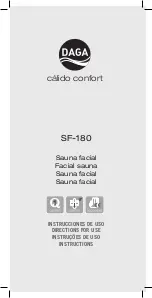
3
Installation
S19-260
Bradley•
215-770 Rev. L; ECN 12-05-003C
10/22/2012
1" (25mm)
Ø 12
⁷⁄₈
" (327mm)
11½"
(292mm)
3
⁷⁄₈
" (98mm)
7¾"
(197mm)
13
⁵⁄₈
"
(346mm)
9¼"
(235mm)
6"
(152mm)
Ø
⁷⁄₈
"
(22mm)
Installation Instructions
NOTICE! Avoid cleaners containing organic solvents,
alcohols, and hydrocarbons. Rinse with water
after cleaning.
Supplies Required:
•
Supply piping to ½" NPT water supply inlet
•
Drain piping to 1¼" NPT
•
Tailpiece and trap to conform to local codes
•
Sign-mounting hardware
Local codes may require the installation of a backflow
prevention valve to complete proper installation. Compliance
with local codes is the responsibility of the installer. Valve
must be tested annually to verify that it is functioning
properly. Backflow prevention valves are not included
with the fixture and may be supplied by the contractor or
purchased from Bradley Corporation.
Step 1: Prepare deck
1. Select the desired location for the eyewash on the deck and
make the necessary cutouts per the rough-ins.
Step 2: Install eyewash
IMPORTANT! To ensure proper operation, the handle
assembly should be in the “up” position
while the ball valve is closed. To make the
adjustment, rotate the handle assembly
180° and reattach to the ball valve.
1. Assemble the valve and pipe as shown on page 4 and
connect it to the bowl.
2. Lower the complete assembly through the cutout and secure
it to the deck with the mounting hardware provided.
3. Attach the eye/face wash to the bowl.
4. Install the operating rod mechanism through the hole
provided.
5. Attach the operating lever to the valve and secure.
Step 3: Connect water supply
1. Connect the water supply piping to the ½" NPT inlet on the
unit (piping supplied by installer).
2. Connect the drain piping to the 1¼" NPT drain outlet on the
unit (piping supplied by installer).
3. Mount the safety sign to a wall using sign-mounting
hardware (supplied by installer).
4. Open the water supply lines. Test for leaks and adequate
water flow.
All dimensions assume standard thread
engagement. Variations in manufacturing allow
for +/-
1
⁄
8
" (3mm) per threaded joint. To find
the tolerance of a dimension, add the number
of thread joints in between a dimension and
multiply it by
1
⁄
8
" (3mm).




























